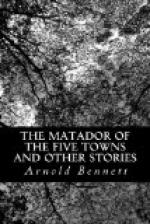“Come and see the boys take them,” he said at the foot of the stairs.
In a sort of hall on the ground floor was a long counter, and beyond the counter a system of steel railings in parallel lines, so arranged that a person entering at the public door could only reach the counter by passing up or down each alley in succession. These steel lanes, which absolutely ensured the triumph of right over might, were packed with boys—the ragged urchins whom we had seen playing in the street. But not urchins now; rather young tigers! Perhaps half a dozen had reached the counter; the rest were massed behind, shouting and quarrelling. Through a hole in the wall, at the level of the counter, bundles of papers shot continuously, and were snatched up by servers, who distributed them in smaller bundles to the hungry boys; who flung down metal discs in exchange and fled, fled madly as though fiends were after them, through a third door, out of the pandemonium into the darkling street. And unceasingly the green papers appeared at the hole in the wall and unceasingly they were plucked away and borne off by those maddened children, whose destination was apparently Aix or Ghent, and whose wings were their tatters.
“What are those discs?” I inquired.
“The lads have to come and buy them earlier in the day,” said Buchanan. “We haven’t time to sell this edition for cash, you see.”
“Well,” I said as we left, “I’m very much obliged.”
“What on earth for?” Buchanan asked.
“Everything,” I said.
We returned through the squares of Hanbridge and by Trafalgar Road to Stirling’s house at Bleakridge. And everywhere in the deepening twilight I could see the urchins, often hatless and sometimes scarcely shod, scudding over the lamp-reflecting mire with sheets of wavy green, and above the noises of traffic I could hear the shrill outcry: “Signal. Football Edition. Football Edition. Signal.” The world was being informed of the might of Jos Myatt, and of the averting of disaster from Knype, and of the results of over a hundred other matches—not counting Rugby.
V
During the course of the evening, when Stirling had thoroughly accustomed himself to the state of being in sole charge of an expert from the British Museum, London, and the high walls round his more private soul had yielded to my timid but constant attacks, we grew fairly intimate. And in particular the doctor proved to me that his reputation for persuasive raciness with patients was well founded. Yet up to the time of dessert I might have been justified in supposing that that much-praised “manner” in a sick-room was nothing but a provincial legend. Such may be the influence of a quite inoffensive and shy Londoner in the country. At half-past ten, Titus being already asleep for the night in an arm-chair, we sat at ease over the fire in the study telling each other stories. We had dealt with the arts, and with medicine; now we were dealing with life, in those aspects of it which cause men to laugh and women uneasily to wonder. Once or twice we had mentioned the Brindleys. The hour for their arrival was come. But being deeply comfortable and content where I was, I felt no impatience. Then there was a tap on the window.




